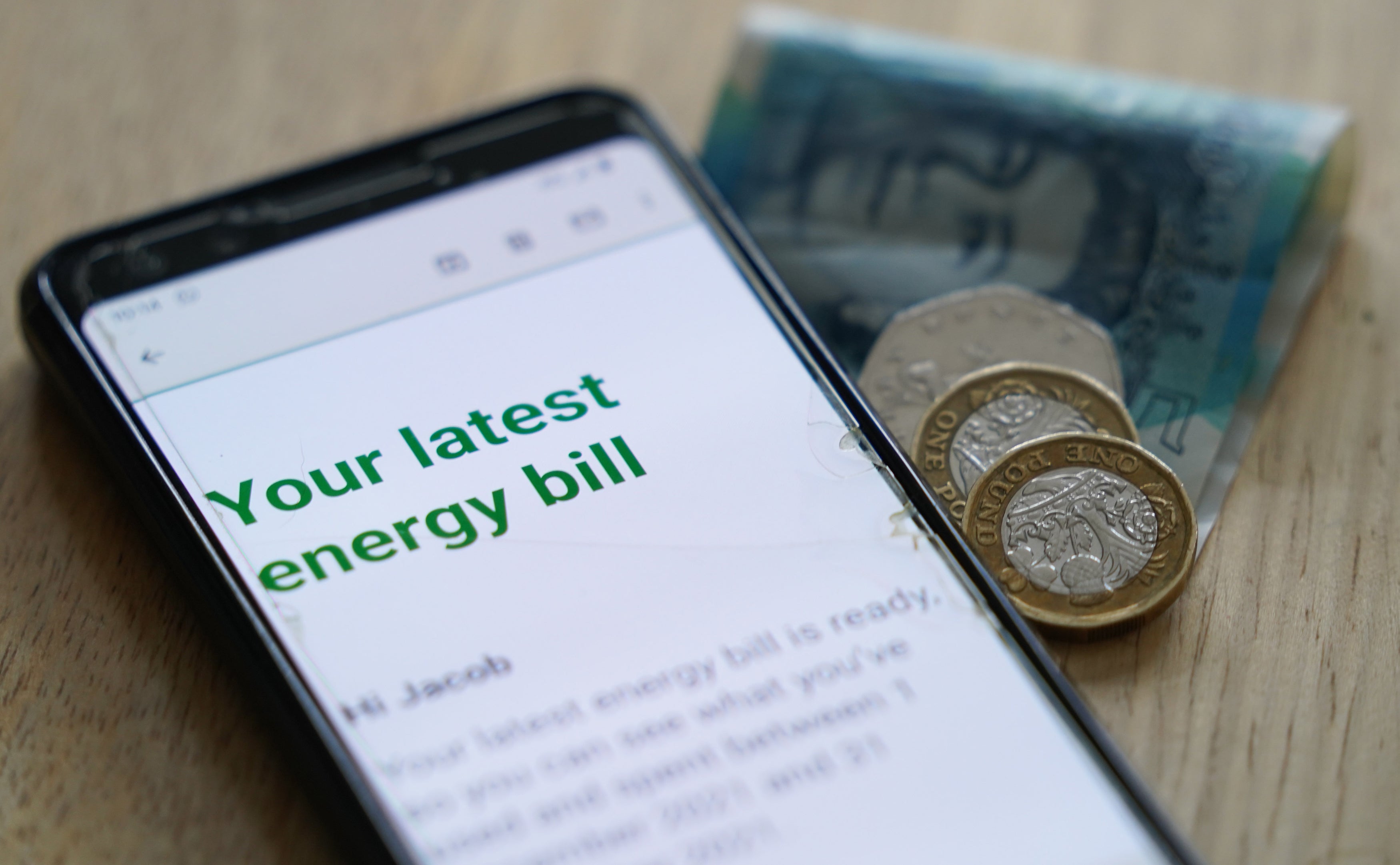As the end of 2025 draws nearer, higher bills combined with lower temperatures mean many will be facing increased costs in the approach to Christmas.
For millions across the country, managing the cost of living remains a daily struggle as prices continue to rise faster than household incomes.
Despite inflation returning to pre-pandemic levels, the cost of goods has remained persistently high in the face of stagnant wages. At the same time, exorbitant household bills mean millions are grappling with debts to afford the essentials.
Around 14 million adults are going without food because they cannot afford it, recent research by the Trussell Trust found. Meanwhile, energy arrears have more than doubled over the past five years, rising to £4.4bn by the end of June.
Anti-poverty charity the Joseph Rowntree Foundation has said that low-income families in the UK are on course for the worst fall in living standards on record by the next election in 2029.
Against this difficult economic backdrop, it is important that households claim all the support they are entitled to. There are now around 24 million people in the country claiming some combination of DWP-administered benefits, which include those drawing a state pension, representing around one in three people.

Yet new research by Policy in Practice shows that £24bn worth of benefits goes unclaimed every year – you can use its helpful calculator to work out what you might be entitled to.
Are you living in a household affected by the two-child benefit cap? Get in touch via email: [email protected]
Here is an overview of the financial support available to households this November and key dates for benefit and state pension recipients to look out for:
Get a free fractional share worth up to £100.
Capital at risk.
Terms and conditions apply.
Go to website
ADVERTISEMENT
Get a free fractional share worth up to £100.
Capital at risk.
Terms and conditions apply.
Go to website
ADVERTISEMENT
Benefit payment dates in November
Benefit payments will be going out as normal in November, as there are no bank holidays to be aware of. These include:
- Universal credit
- State pension
- Pension credit
- Child benefit
- Disability living allowance (DLA)
- Personal independence payment (PIP)
- Attendance allowance
- Carer’s allowance
- Employment support allowance (ESA)
- Income support
- Jobseeker’s allowance
For more information on how and when state benefits are paid, visit the government’s website.
The DWP is aiming to complete the migration of all “legacy benefits” to universal credit by January 2026. Those receiving tax credits, income support, jobseeker’s allowance, and housing benefit should have received a notice about moving to universal credit already.
Are you having issues with PIP, universal credit, or any other benefit? Get in touch via email: [email protected]
Pension payment dates in November
The basic state pension is paid straight into bank accounts, similarly to how benefits are paid. It is usually paid every four weeks, with the exact day you receive it corresponding to the last two digits of your national insurance (NI) number.
Here’s when you should be paid based on those numbers:
- 00 to 19: Monday
- 20 to 39: Tuesday
- 40 to 59: Wednesday
- 60 to 79: Thursday
- 80 to 99: Friday
When will benefit rates go up?
In April, all benefits were uprated by 1.7 per cent, matching the September 2024 inflation figure. The increase applied to all working-age benefits, including universal credit, PIP, DLA, attendance allowance, carer’s allowance, ESA and more.
Meanwhile, in line with the triple lock, the state pension rose by 4.1 per cent – up £472 a year – matching wage growth in 2024.
In April 2026, all universal credit claimants will receive an above-inflation increase to their income following the passage of Labour’s controversial welfare bill. These extra-inflationary increases will continue yearly until 2029, with the first being a rise of at least 2.3 per cent.
However, at the same time, the monthly payment rate for the health-related element of universal credit for new claimants will be cut from £105 to £50. This rate will also be frozen until 2029.
This is a reduction of over £200 a month, cutting the additional rate by around half. This means it is advisable for anyone who thinks they might be eligible to apply as soon as they can.
The state pension is expected to rise by 4.8 per cent from next April in line with annual earnings growth. This will bring the weekly amount to £241.05.
Other help available
Budgeting advance loans
The government offers a “budgeting advance loan” for people on universal credit who face an emergency lack of money. The loan has a maximum repayment period of two years.
These loans are interest-free and are automatically deducted from universal credit payments. You can borrow an “advance” of up to:
- £348 if you’re single
- £464 if you’re part of a couple
- £812 if you or your partner claims child benefit
Following Labour’s 2024 Budget, a new cap was introduced on the amount the DWP can deduct from benefit payments to repay loans and debts, including budgeting advance loans.
Beginning in April 2025, deductions from universal credit have been capped at 15 per cent of the standard allowance, down from 25 per cent.
Discretionary Housing Payment
Households can apply to their council for a discretionary housing payment (DHP), which offers financial support to go towards rent or housing costs.
You can only get a DHP if you are in receipt of housing benefit or the housing element of universal credit. It can cover housing costs for a rent shortfall, rent deposits and rent in advance if you need to move home.
Exact eligibility and the funds available are decided on a council-by-council basis, so you will need to get in touch with your local authority to find out more.
Household Support Fund
The household support fund (HSF), distributed by local councils, offers vital assistance to those facing financial hardship, complementing standard benefits and grants.
As part of this government initiative, eligible households throughout the UK can access support such as essential appliances, contributions towards utility bills, and direct cash payments reaching up to £300.
Local authorities are free to decide how to allocate their HSF funding to suit households in their area, so exactly what is available will vary. To apply, households need to contact their council (most offer an online form).
This nationwide programme is set to run until March 2026. The government has committed £1bn in funding to transition it into a “Crisis and Resilience Fund” which will replace the DHP.
Charitable grants
If you are struggling financially, you may be eligible for certain charitable grants. There is a wide range of grants available depending on your circumstances.
However, these grants will typically require you to meet specific criteria and are only able to offer limited funds.
Charitable grants are available for people who are disabled or ill, carers, bereaved, unemployed, students, and for many other reasons. The charity Turn2us has an online tool to search for grants which may be available to some.

Energy provider help
A number of energy suppliers offer help for those struggling with their energy bills. These include British Gas, Scottish Power, EDF, E.ON and Octopus. It is worth contacting your energy provider to find out if you are eligible.
Some also offer free devices like electric blankets for households with vulnerable residents to keep warm.
Social tariffs for broadband and water
For those struggling with household costs, social tariffs are available for both broadband and water bills. This will mean a reduced rate for certain eligible households.
For water, every company operating in the UK has a social tariff by law. However, the amount on offer can vary between regions and, because water providers can’t be chosen like energy providers, the support has been criticised as a “postcode lottery”.
For instance, some offer as much as 90 per cent off bills, while others cap support at a 20 per cent reduction.
To find out what support your water company offers, it is worth checking on its website or contacting the helpline. In all cases, households will need to be deemed to be on a low income and/or in receipt of certain benefits.
Similarly, many broadband providers offer social tariffs to those on certain benefits like universal credit or pension credit. Regulator Ofcom has a guide to what is on offer.
Council tax reduction
If you meet certain criteria or are on certain benefits, you may be able to apply for a discount on your council tax of up to 100 per cent (this is sometimes called council tax support).
Your local council may still be able to offer you a discretionary reduction if you can demonstrate you are facing severe hardship and can’t afford to pay your council tax.
To apply for a council tax reduction, contact your local council via the government’s website.
Up to 30 hours of free childcare
From 1 September 2025, all working parents in the UK became entitled to 30 hours of free childcare for children up to the age of four. This concludes a gradual set of expansions that began in April 2024.
Parents must apply online and reconfirm their eligibility every three months, in time for each school term. Working parents can also apply for tax-free childcare, giving back 20p for every 80p you put towards childcare, up to a maximum of £500 a year.
Energy price cap: Is it going up?
Ofgem’s energy price cap rose by two per cent in October, from £1,720 to £1,755. The £35 rise comes after a more sizeable seven per cent decrease for July to September, from £1,849 to £1,720.
The energy price cap is the maximum amount energy suppliers can charge you for each unit of energy if you’re on a standard variable tariff. That includes most households. It is expressed as an annual bill for an average home.
Many experts – including Ofgem itself – are recommending households consider a fixed tariff energy deal, with many on the market offering lower than the price cap rate.
Will there be another cost of living payment in 2025?
The DWP have not announced any continuation of the Cost of Living Payment scheme that ran between 2022 and 2024. The final payment should have been made to eligible households between 6 February and 22 February 2024.
Mental health support
- In the UK and Ireland, Samaritans can be contacted 24 hours a day, 365 days a year. You can call them for free on 116 123, email them at [email protected], or visit samaritans.org to find your nearest branch
- Mind runs a support line on 0300 102 1234 which provides a safe and confidential place to talk about how you’re feeling. There is also an information line on 0300 123 3393 for nearby support, and a welfare benefits line on 0300 222 5782 to support the mental health of those navigating the benefits system
- Disability charity Scope has a forum where people can have supportive chats with others going through the same experiences
- The NHS offers an online mental health triage service



